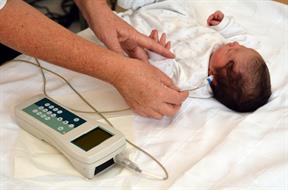ThisisPatientEngagementcontent
Newborn Screening Tests
Learn more about our Patient Engagement products now! Turn your patients into active participants in their healthcare by giving them easy access to the same evidence-based information you trust – but delivered in an easy-to-understand format.
Newborn screening tests are done at the hospital soon after your baby is born. These tests check if your baby was born with certain health problems.
The health problems tested for are rare conditions that might not show symptoms right away. The screening tests find and treat these problems early.
Early treatment can help your baby stay healthy and may even save your baby's life.
The types of screening tests are not the same in all states. All tests are usually done before your child leaves the hospital. Ask your health care team for more information on testing in your state.
Blood test
Within the first two days, your baby will get a blood test. This blood test can be used to screen for conditions that babies can be born with, including:Results are usually available within a week. If your baby has an abnormal result, more testing will need to be done.
Hearing test

Your baby may have a hearing test before leaving the hospital. This easy, painless test checks how your baby's brain reacts to sound. It can be done while your baby is sleeping. You may get the results right away.
Pulse oximetry
Pulse oximetry is another screening test that may be done when your baby is at least 24 hours old. If your baby will be discharged from the hospital before 24 hours of age, the test will be done right before the baby leaves the hospital.Ask the provider, or the department that is doing the tests, when the results will be ready. You will be contacted if more testing is needed.
This information is not intended to replace advice given to you by your health care provider. Make sure you discuss any questions you have with your health care provider.
Cookies are used by this site. To decline or learn more, visit our cookie notice.
Copyright © 2025 Elsevier, its licensors, and contributors. All rights are reserved, including those for text and data mining, AI training, and similar technologies.